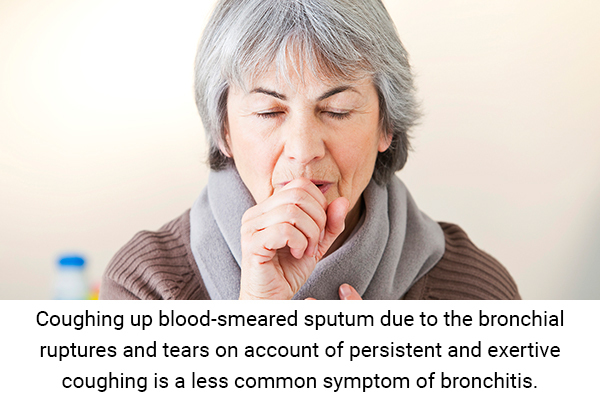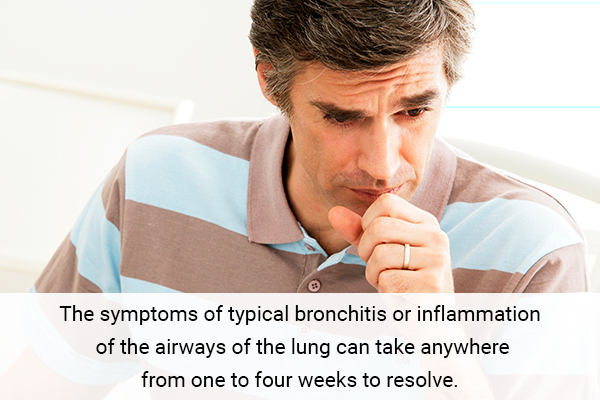In this article:
Bronchitis is the inflammation, swelling, or infection of the bronchial tubes that carry air to and from the lungs. (1) These air passages branch off on either side of your windpipe (trachea) into smaller airways, known as bronchioles, through which air is passed to and expelled from the lungs.

The walls of the bronchial airways secrete mucus that serves the function of trapping the incoming dust and other irritants that could otherwise aggravate and disrupt your normal respiratory functioning.
Unlike the common cold or flu, the nagging cough induced by a case of bronchitis tends to stick around for longer than the expected couple of weeks if not attended to properly.
Types of Bronchitis
Bronchitis can be described as being either: (2)
1. Acute bronchitis
Acute bronchitis is the most common variant of this condition. It is relatively short term, marked by a temporary inflammation of the airways and usually follows in the footsteps of some other upper respiratory infection.
Also called a chest cold, this condition has the characteristic symptoms of a cough and increased mucus production, which resolve in a matter of three weeks or less.
Acute bronchitis episodes are more prevalent during winter and among children under the age of five, although it is not exclusive to them.
2. Chronic bronchitis
Chronic bronchitis is a type of chronic obstructive pulmonary disease (COPD) along the same lines as some other progressive lung conditions that cause permanent respiratory damage such as emphysema.
Unlike acute bronchitis, this condition is far more severe and long term and presents itself with a daily productive cough that lasts for three months, followed by recurrent episodes throughout the next two years.
In fact, the damage caused by this advanced stage of bronchitis to the bronchial tubes may never be completely undone, and the symptoms tend to recur frequently.
Chronic bronchitis can set in on account of prolonged exposure to environmental toxins, such as tobacco smoke, air pollution, chemical fumes, and dust, and it is more common among people over 40. Moreover, repeated bouts of acute bronchitis can cause bronchial distress to turn chronic.
What Causes Bronchitis?

Both viral and bacterial pathogens can be held culpable for a case of bronchitis infection, especially if it’s acute bronchitis. However, viruses that cause the common cold or flu are the most usual suspects. (1)(2)
You can contract this infection by inhaling the air containing tiny virus-containing airborne droplets that come out of the nose and mouth of an infected person when he/she coughs or sneezes in your vicinity.
You can also pick up the bug by coming in contact with contaminated surfaces and items at home and in public places, such as door handles and keyboards.
The usual mode of transmission is through the hands that touch a virus-ridden object and are subsequently placed near the nose or mouth, through which the virus makes its way into your system.
Signs and Symptoms of Bronchitis
Symptoms associated with bronchitis include: (1)(2)

- Persistent cough, which may bring up thickened and discolored mucus
- Wheezing, particularly in the case of chronic bronchitis
- Low fever and chills
- Tightness in the chest
- Sore throat
- Body aches
- Running out of breath
- Headaches
- Constant feeling of tiredness
- Blocked nose and sinuses
The symptoms of acute bronchitis are usually more severe than those of its chronic counterpart and last for 3–10 days. However, the cough that starts off with some degree of mucus expulsion can progressively turn into a dry, hacking cough, which persists for several weeks.
As a result of the continual coughing, your chest and stomach muscles tend to become sore.
As for chronic bronchitis, you will have to bear with a stubborn cough accompanied by clear, yellow, white, or green phlegm. The condition tends to worsen two or more times every year, particularly during the colder months.
Other less commonly reported symptoms include:
- Foul breath, as you are forced to breathe through your mouth due to blocked sinuses, thereby enabling oral bacteria to thrive
- Coughing up blood-smeared sputum due to the bronchial ruptures and tears on account of persistent and exertive coughing
- Disrupted sleep due to the constant coughing and nasal congestion
Risk Factors Regarding Bronchitis

People who are increasingly predisposed to developing this condition include: (1)(2)
- Breathing-in irritant substances – If you live in or frequently travel to places with toxic levels of air pollution, then you are at an increased risk of contracting this disease. Inhaling irritant substances, such as smog, chemicals in household products, and tobacco smoke, can wreak havoc on your respiratory system and trigger this condition. Cigarette smoking has emerged as the top culprit for chronic bronchitis, not just for active smokers but also for people who passively inhale secondhand cigarette smoke.
- Occupational exposure – Frequent or long-term exposure to chemical fumes, dust, and other such toxins at your workplace can be hazardous to your lungs and can give rise to bronchitis and other forms of COPD. Unless the pulmonary damage has not reached an incurable stage, the symptoms of this type of “occupational bronchitis” tend to subside once you are no longer exposed to the irritant substance. Some of the standard occupational irritants include:
- Ammonia
- Strong acids
- Grain dust
- Chlorine
- Textiles (fabric fibers)
- People with subpar immunity, either due to a recent bout of illness or some other chronic condition
- Infants, young children, and the elderly, given their immune system is either underdeveloped or compromised
- People grappling with some other lung conditions, such as asthma
Complications Related to Bronchitis
- Perhaps the single most noteworthy complication of bronchitis is pneumonia. On average, 1 out of 20 people suffering from bronchitis is faced with this complication. Pneumonia develops when the infection spreads further into the lungs, causing fluid retention in the tiny air sacs inside the lungs.
- Another variant of pneumonia is known as aspirational pneumonia, which results from accidental ingestion of food through the windpipe. Bronchitis can have you break into a cough at the most unexpected times, including while you are eating. This can cause your food to get stuck in the throat and go down the wrong route into the lungs instead of the stomach. This gives rise to an extremely persistent infection that can completely wash you out.
- One of the common repercussions of chronic bronchitis is that your breathing becomes labored for an extensive period, sometimes even for good. This can exert significant pressure on your blood to keep pumping blood at the optimal level, eventually leading to cardiovascular ailments, including heart failure.
- If your bronchitis makes a comeback every now and again, it could even be taken as a sign of possible COPD. (2)
When to See a Doctor
At the outset, bronchitis can often be mistaken for a garden-variety viral infection such as the cold or the flu.
However, if your cough shows no sign of subsiding or the symptoms are more debilitating than a regular case of sniffles and cold, you’re probably in the throes of a bronchitis infection.
Managing bronchitis generally hinges on adequate self-care, which entails giving your body a break, through optimum rest, taking plenty of fluids, and a course of anti-inflammatory medication.
However, if you experience the following warning signs, a visit to the doctor should be in order:
- Cough sticking around longer than 3 weeks at a stretch
- Coughing up blood-speckled sputum
- Hands and feet appear swollen or puffier than usual
- Running a high temperature for 3 days on end or longer
- Suffering from any preexisting lung or heart ailment
- Inability to catch your breath after the slightest physical exertion or even at rest
- Chest pains
- Drowsiness and confusion
- Symptoms making a comeback after full recovery and appearing worse than before
People suffering from bronchitis often try over-the-counter medications to manage the symptoms. There are also many simple, natural home remedies that can provide relief.
Expert Answers (Q&A)
Answered by Dr. Laren Tan, MD (Pulmonologist)

The symptoms of typical bronchitis or inflammation of the airways of the lung can take anywhere from one to four weeks to resolve. The time to fully recover depends on many factors, but one thing that can prolong recovery time is having a chronic respiratory condition.
More than half of the cases of bronchitis that are due to an infection have been reported to be associated with viruses. Of course, the number of bronchitis infections due to viral infections can vary depending on the time or season of the year.
Antibiotics are unlikely to be of great benefit to treat bronchitis caused by a virus. Initial treatment for a majority of bronchitis cases should be directed towards symptom control.
Staying hydrated, avoiding noxious inhaled stimuli (for example, tobacco smoke) and other over-the-counter cough medications can be beneficial during the recovery phase.
In the initial phase of bronchitis and flu, the cough can be difficult to distinguish, but flu typically is associated with other systemic clinical findings such as fever, myalgia, generalized weakness, and chills.
Bronchitis is typically not a fatal disease in those who are healthy and do not have any chronic respiratory diseases.
This depends on the cause of their bronchitis, whether it is viral or bacterial because it can be challenging to determine.
I typically tell my patients that they may be contagious up to a week but because their cough lingers beyond one week, it is hard to provide an exact time frame when they are no longer contagious.
Final Word
Avoidance of sick contacts and any inhaled noxious stimuli (i.e. vaping, tobacco smoke, marijuana smoke), eating a well-balanced healthy diet, exercising and weight loss can all help in warding off bronchitis.

- Was this article helpful?
- YES, THANKS!NOT REALLY



